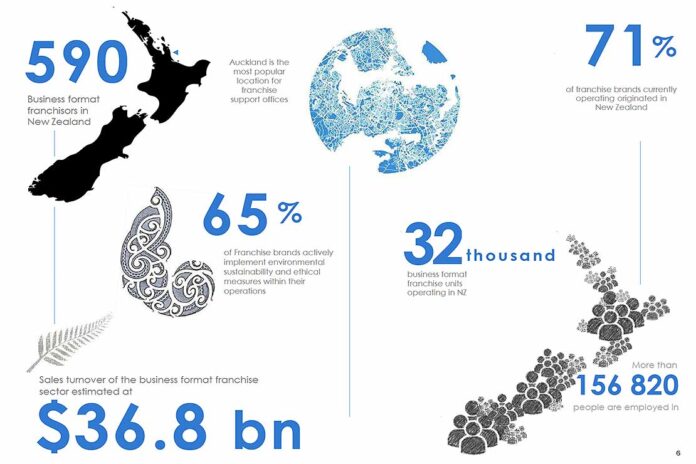Source: Massey University
Some of the key findings from the latest Franchising New Zealand 2021 report.
The survey, the tenth of its kind, was conducted between 30 September and 29 October by the Massey Business School, and sponsored by the Franchise Association of New Zealand. Report author Professor Jonathan Elms says the $9.2 billion increase in business format franchise turnover, which excludes sales from motor vehicle and fuel retail, despite difficult trading/operating conditions and lower projected total units reflects the intrinsic resilience of the franchising business model.
“The New Zealand franchise system is a significant contributor to the economy, and involves multiple businesses and industry sectors. Despite a very constrained operationing environment, the franchise system continues to deliver through being adaptable and flexible. There are some world-class operators leading the way in New Zealand.”
The survey found there to be 590 business format franchisors in New Zealand, with 71 per cent of these brands being homegrown. The sales turnover of the business format franchise sector is estimated at $36.8 billion, up from $27.6 billion in 2017.
The survey data was gathered during a period of continued border closures and business restrictions that limited trading opportunities and generated operating and economic uncertainty.
Franchise Association Chief Executive Robyn Pickerill says when asked about the impacts of COVID-19 on business, the top three responses returned were the significant disruptions to trading, greater levels of stress and mental health concerns, and adjusted hours of operation. The key challenges going ahead are labour shortages with a lack of suitable skilled staff in many areas, supply chain issues and the uncertainty of periodic business interruptions.
However, Mrs Pickerill says that despite these impacts, franchise operators continue to show resilience and adaptability to succeed, recognising a number of opportunities that the pandemic had brought to light. “Diversification, having an increased online presence and targeting local disposable income were all identified as areas of opportunity that the pandemic have highlighted to business owners.”
Professor Elms says franchise employment has also risen, at a rate of around 8000 a year since 2017. “Franchise businesses are employing more staff than in 2017, which again speaks to the resiliency of the business model. At present it’s estimated there are 156,820 people employed in a franchise operation in New Zealand.”
The support franchise owners receive as part of the business model is another feature that Professor Elms believes is integral to its success.“The support offered by franchisors and fellow franchises is unique to the sector. This is evidenced through sharing best practices, investment in training and development, and community engagement. All are necessary to help franchises weather the COVID-19 storm.”
Further key findings include:
- New employees within franchisee units receive 40 hours of training within their first year, while established employees receive 20 hours of training per year.
- 97 per cent of franchisors provide training to reinforce employment best practice and compliance.
- 65 per cent of franchise brands actively implement environmental sustainability and ethical measures within their operations.
- There are 32,000 business format franchise units operating in New Zealand.
- Auckland is the most popular location for franchise support offices.
The main purpose of the franchise survey is to obtain current information about the structure, practices and performance of the franchise sector in New Zealand, including recent trends and challenges. Conducting the survey regularly will help the sector to build an analytical time series and set benchmarks for future performance. Survey sponsors include Westpac, Nexia New Zealand, Franchize Consultants, The Franchise Coach, Stewart Germann Law, Iridium Partners and Franchise New Zealand Media.



